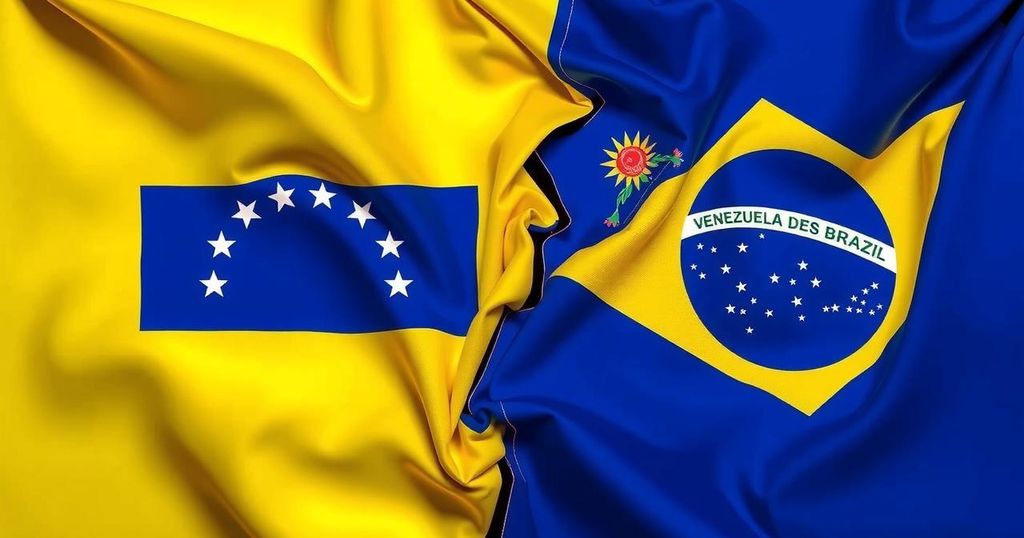Venezuela Recalls Ambassador to Brazil Following BRICS Veto
Venezuela recalled its ambassador to Brazil after Brazil vetoed its application to join the BRICS alliance. This diplomatic action follows turmoil due to the disputed July elections in Venezuela. Maduro’s administration criticized Brazilian diplomats for their veto and retaliated by summoning Brazil’s charge d’affaires.
On October 30, 2024, Venezuela’s foreign ministry announced the immediate recall of its ambassador to Brazil for consultations. This action was taken subsequent to the Brazilian government’s veto of Venezuela’s application to join the BRICS consortium of emerging economies. The decision, made by Brazilian President Luiz Inacio Lula da Silva’s administration, provoked consternation in Venezuela, where President Nicolas Maduro considers Brazil as a strategic ally. In its official statement, the Venezuelan foreign ministry indicated that Ambassador Manuel Vadell was ordered to return for consultations immediately, and that Brazilian charge d’affaires in Caracas had been summoned to express Venezuela’s discontent over the veto. The ministry refrained from directly criticizing Mr. Lula, who was unable to attend the recent BRICS summit in Russia due to a head injury but did lambaste the actions of Brazilian diplomats, which they alleged undermined consensus among BRICS members. The diplomatic rift comes amid heightened tensions stemming from the recent controversial elections in Venezuela, where Maduro’s victory has been contested by opposition factions. Following the elections held on July 28, where electoral officials proclaimed Maduro the winner without providing comprehensive results, opposition candidate Edmundo Gonzalez Urrutia claimed a landslide victory based on published polling data. Brazil has yet to acknowledge Maduro’s re-election amidst calls for electoral transparency from various Latin American countries, including Argentina and Peru, which support the opposition claims. Though Mr. Lula had been associated with Maduro’s predecessor, Hugo Chavez, he has publicly criticized Maduro’s government as “very unpleasant” and indicative of an “authoritarian bias.” The Venezuelan foreign ministry’s statement particularly highlighted the comments from former Brazilian Foreign Minister Celso Amorim. According to the Venezuelan officials, Amorim’s assertion that Brazil’s veto stemmed from Caracas’s failure to conduct transparent elections was labeled as an attack on Venezuela. Amorim served as an observer during the disputed elections, exacerbating the ire from Caracas. The Venezuelan government went further to accuse Amorim of acting as a “messenger of North American imperialism,” and President Jorge Rodriguez of the Venezuelan parliament urged for his declaration as persona non grata.
Venezuela’s relations with Brazil have been polarized following the recent elections marred by allegations of electoral malpractice. Maduro’s regime, facing opposition claims to election victory, sought inclusion in the BRICS group to bolster its international standing. However, Brazil’s veto of this bid has outlined the growing rift not only regarding electoral legitimacy but also in broader foreign relations. Historical ties between Venezuelan leadership and Brazilian governments have faced strains due to shifts in political narratives and external pressures from other Latin American states and the U.S.
The recall of Ambassador Manuel Vadell reflects Venezuela’s growing frustration over perceived betrayal by its regional ally Brazil. This incident underscores the emerging discord stemming from the disputed electoral landscape in Venezuela, where opposition voices challenge the legitimacy of Maduro’s government. The implications of such diplomatic maneuvers may further isolate Venezuela on the international stage and hinder its aspirations for membership in influential economic coalitions like BRICS.
Original Source: www.thehindu.com




Post Comment